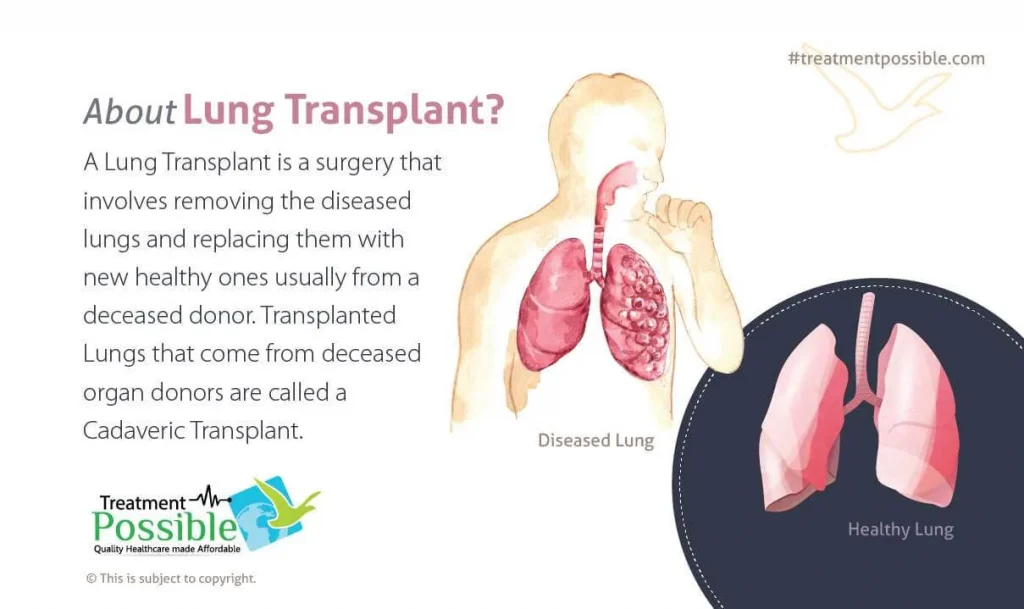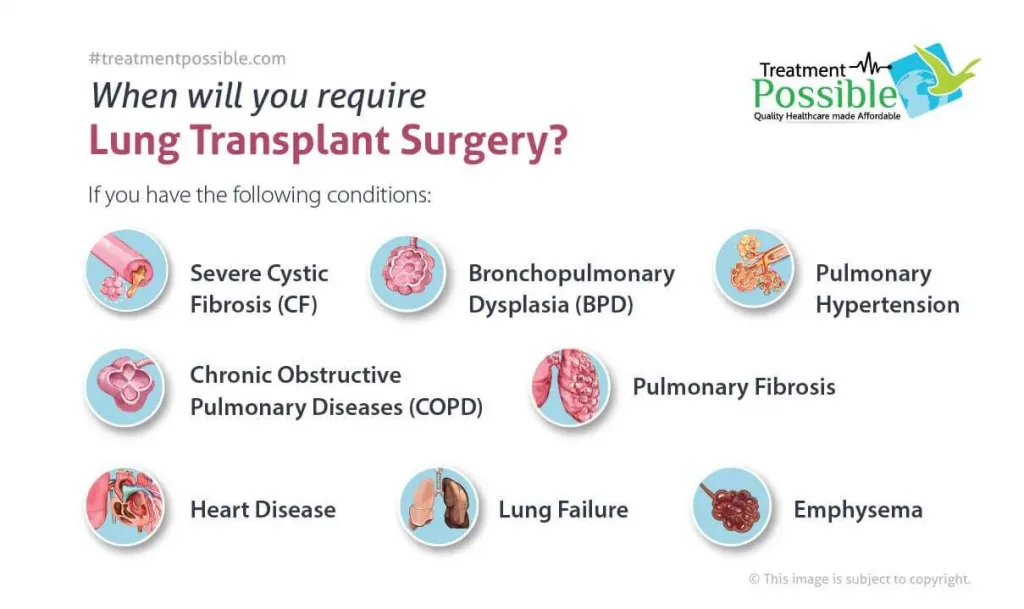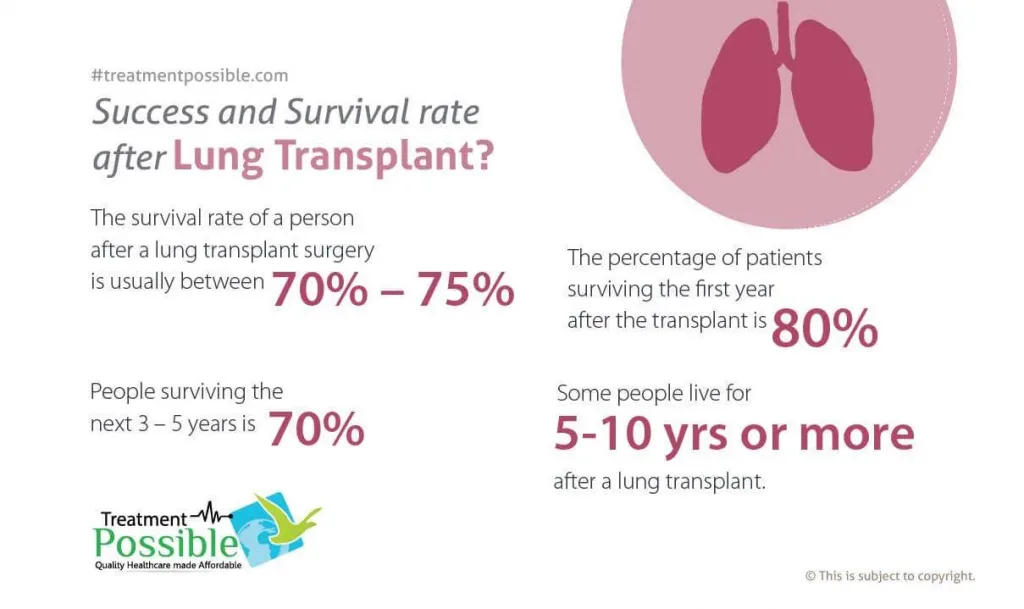Lung Transplant in India
We help you find and connect with the best transplant hospitals in India which are equipped with the latest medical equipments ensuring that you get quality treatment at an Affordable Cost.

What is Lung Transplant?
A lung transplant is a surgery that involves removing the diseased lungs and replacing them with new healthy ones usually from a deceased donor. Transplanted Lungs that come from deceased organ donors are called cadaveric transplants. Non- Smoking Adults who have Healthy lungs can also donate a segment of their lungs known as a lobe and still live a healthy life.
There are different types of lung transplant procedures which include the following:
- Single Lung Transplant: As the name suggests only one lung is transplanted.
- Double Lung Transplant: In this procedure both the lungs are transplanted.
- Bilateral Sequential: In this procedure both the lungs are transplanted but is done one at a time.
- Heart-Lung Transplant: It is the transplant of both lungs and the heart taken from a single donor (deceased).
- Living Donor Lobar Lung Transplant: In this procedure, only a segment of the lungs known as the lobe is transplanted from a donor.
When will you require Lung Transplant?
A lung transplant will be needed for the following conditions:
- Severe cystic fibrosis (CF): CF is an inherited disease that causes problems in the glands that make sweat and mucus secrete thick fluids causing the blockage of passages in the lungs.
- Bronchopulmonary dysplasia (BPD) or chronic obstructive pulmonary disease (COPD): It is a lung disease that interferes with normal breathing.
- Pulmonary hypertension: Increased blood pressure in the arteries of the lungs.
- Heart disease: Cardiac diseases or heart defects, which affect the lungs, may need a heart-lung transplant.
- Pulmonary fibrosis: Damaged and scarred lung tissues
- Lung failure: The lung failure symptoms is when you cannot breathe properly
- Emphysema: Damaged air sacs (alveoli) in the lungs causing shortness of breath
- Other diseases that cause severe lung damage including sarcoidosis, histiocytosis, and lymphangioleiomyomatosis.

Who is an Eligible Candidate for Lung Transplant?
A person may not be an eligible candidate for lung transplant surgery for the following reasons mentioned below:
- If you having an active infection that cannot be treated
- If you have cancer that has spread to other parts of the body (metastatic cancer)
- If you have health issues such as kidney, liver or heart diseases
- Not willing to stick to the requirements after a lung transplant such as not drinking alcohol or not smoking
- A lung transplant is not advised for lung cancer patients.
How does the Waiting List work for a Lung Transplant Donor?
If the transplant team determines that you are an eligible candidate for a lung transplant, the transplant center will register your name on a waiting list. While you are on the waiting list, your medical team will closely monitor your condition and adjust your treatment as required. Your physician may recommend healthy lifestyle changes, such as eating a healthy diet, getting regular exercise and avoiding tobacco.
Your physicians may recommend that you participate in a pulmonary rehabilitation program while you wait for a donor’s lung. Pulmonary rehabilitation will help you to improve your health and ability to function in daily life before and after your transplant.
What Happens during a Lung Transplant?
Lung transplant procedure is performed with general anesthesia.
- Step 1 – A breathing tube will be put into your throat and you will be connected to a heart-lung machine, which will help to pump your blood and oxygenate it during surgery.
- Step 2 – A catheter will be put into your bladder to drain urine during the surgery. Your heart rate, blood pressure, and breathing are monitored during the procedure.
- Step 3 – Your surgeon will make a large incision in your chest, through which your old lung will be removed, and your new lung will be connected to your main airway and blood vessels.
- Step 4 – When the new lung is working properly, the incision will be closed.
Want more clarification about medical expense & treatment plan?
What Happens after Lung Transplant?
- Immediately after the surgery, you will be moved to an Intensive Care Unit (ICU) after the transplant. A mechanical ventilator will help you breathe for a few days, and the tubes in your chest will drain fluids from your lungs and heart.
- A tube in a vein will deliver strong medications (immunosuppressants) to control the pain and to prevent rejection of the transplanted lung. As your condition improves, you will no longer need the mechanical ventilator, and you will be shifted from the ICU.
- After your discharge, the lung transplant team will monitor you for three months to prevent, detect and treat complications and assess your lung function. During this time, you will need to stay close to the transplant center. Afterwards, follow-up visits will be less frequent.
- Your transplant team will monitor you closely and help you manage the side effects of immunosuppressant medications. You will also be monitored for any signs or symptoms of rejection, such as shortness of breath, fever, coughing or chest congestion. It is important to inform your transplant team if you notice any signs or symptoms of rejection.
What are the Risks after Lung Transplant?
Just like any surgery lung transplant does possess some risks but the recent developments in technology have increased the life expectancy of patients to about 70% after surgery. The risks of Lung transplant procedure are:
- Bleeding
- Infection
- Blockage of the blood vessels to the donated lungs
- Blockage of the airways
- Severe pulmonary edema (fluid in the lung)
- Blood clots
- Rejection of the donated lungs
Organ rejection is the major risk of a lung transplant, which is a normal body reaction to a foreign object. When an organ is transplanted into a person’s body, their immune system will see it as a threat and attack the organ. To allow the transplanted organ to survive in a new body, medicines will be used to trick the immune system not to attack the donated lung. The medicines used to prevent or treat rejection include medications to suppress your immune system (immunosuppressant medications), to prevent organ rejection. You will have to take these anti-rejection drugs for the rest of your life.
What are the Side Effects of Anti-Rejection Drugs?
Anti-rejection drugs may cause noticeable side effects, including:
- Weight gain
- Facial hair
- Stomach problems
Some anti-rejection medications increase your risk of developing conditions, such as:
- Diabetes
- Kidney damage
- Osteoporosis
- Cancer
- High blood pressure (hypertension)
What is the Survival Rate after Lung Transplant?
A lung transplant can improve your quality of life, but the first year after the transplant is the most critical period, because of surgical complications and rejection. The survival rate of a person after a lung transplant surgery is usually between 70% – 75% i.e the percentage of patients surviving the first year after the transplant is 80% and people surviving the next 3 – 5 years is 70%. Some people live for 5 to 10 years or more, after a lung transplant.

What is the Cost of Lung Transplant in India?
Average Cost of lung transplant in India is $28000 which is 80% – 90% cheaper than in western countries like the USA & UK. Other than the cost of surgery you also have to consider the cost of accommodation in India. We also provide service apartments which cost $20/day compared to the daily cost of $55 in hotels. The total period of your stay in India will be around 3 months, depending on your treatment plan it may vary.
If you want to plan your lung transplant in India we help you in guiding you to find the best hospitals and surgeons in India who specialize in lung transplant surgery, you can contact us via email at care@treatmentpossible.com or fill out the form below to undergo lung transplant in India. For queries regarding your treatment or to get online consultation from a surgeon, you can WhatsApp Us.
Get Lung Transplant in Just 3 Easy Steps

Fill the Form Below
We will set up a free online call with an experienced surgeon.

Consult an Experienced Surgeon
Get all the information that you need regarding the transplant i.e. the treatment plan, pre-surgery tests, doner info, cost estimate for the transplant and answers to all your queries.

Plan Your Surgery in India
Fill out necessary forms and documents and travel to India for a successful transplant!
Do you have a query?
Feel free to contact us! We are happy to help.
